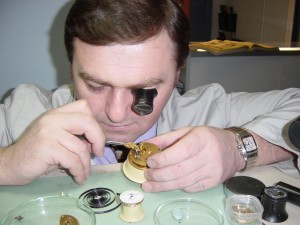Unlike other career choices, an interest in watch repair usually starts as an interest, it then progresses into a hobby, and then finally matriculates to a profession for a number of enthusiasts. Antique and modern watches are in need of appraisal, cleaning, repair, assessment of replacement, etc. Furthermore, digital watches warrant professionals with electronic engineering knowhow. Through accredited colleges and technical schools, professional clinics and apprenticeships, hobbyists evolve to professional watchmakers and repair specialists.
Why?
Watch making and repair may seem like an obscure subject or point of interest to some, yet those who enjoy a challenge, a rich history of tinkering, and evaluating a range of antique to modern pieces spanning fifty years and more, gravitate toward the craft.
Additionally, a trove of ‘wheel-and-deal’ reality shows invite a renewed interest in antique jewellery and wrist pieces. Watch repair is also a lucrative business for professionals who dedicate the time and patience in learning, evolving and accentuating on business opportunities.
How
Time (no pun intended) is a watch professional’s greatest asset and tool. Through experience in working with various components and facilitating fine hand skills, professionals augment skill sets and improve their value. Time is logged through apprenticeships, classroom environments, and credits accumulated at accredited technical schools and universities.
Theoretically, any person can open a watch repair business; so, consumers need approach vendors with caution. Yet, accredited and experienced professionals are not shy about answering preliminary questions or showing references and accreditations.
Who
Who becomes watchmakers and repair people? People interested in puzzles, weaving, electronics, and tests of patience. The industry invites people of a number of backgrounds. For example, antique timepieces and wrist watches beseech personalities interested in learning how to assess value and identify fakes. Alternatively, digital pieces warrant the presence of those with electronic engineering knowhow and the ability (and patience) to work meticulously with small wires and components.
It’s an intense interest, Sunday hobby, second income, or small business calling for anyone with an immediate to lingering affinity for watch repair.
Watchmaking School
For those dedicated to earn a degree, watchmaking schools are the way to go. Through such degrees offered at places like Oklahoma State University’s Institute of Technology, aspiring watchmakers learn the basics as well as receive advanced training in the profession. Earn an associate in applied science in just two years to kickoff a career. Courses include everything from microtechnology to quartz watch repair to management and quality control. Earning a degree gives you substantial credentials for attracting clients, regular contact with other professionals through instructors, networking and mentorship opportunities, and direct access to professional organizations such the American Watchmakers-Clockmakers Institute.
AWCI
If a full degree isn’t right for you, the American Watchmakers-Clockmakers Institute offers accredited classes as well. As mentioned above, entrepreneurs build a reputation and initial signals of trust based on their graduation from offered classes. The current-day exam spans four days, focusing on five major areas of watch repair and creation. Furthermore, upon graduation, makers and repairers are “encouraged” to continue education regarding the industry indefinitely.
As mentioned, accreditation from an esteemed institution like AWCI is not necessary to exact efficient repair services, yet the institute recognizes benefits of graduation that include better revenue, clientele, and distinction from competitors.
What
What can a consumer or party interested in becoming a watchmaker or repair professional expect from a vendor? The AWCI tests reflect common to complex plights of modern-day watch vendors. For example, graduates and professionals must know how to:
- – Replace (or rebuild) teeth in wheel by hand
- – Completely dismantle, clean, oil, and repair a watch
- – Rebuild a lantern pinion
- – Perform general maintenance on a 3-chime floor clock
In addition to physical trials, graduates are required to answer theoretical-based questions regarding handling clients and repair complications. What else do watchmakers do? Ask Manhattan Time Service or vendors in your area.
Clinics
A number of institutions and private parties host clinics, involving lectures, demonstrations, and hands-on training and review. A number of entrepreneurs, rather than invest in certification, choose to visit a number of clinics, speaking with professionals and teachers about the realities of watch repair and creation.
The certification vs. clinic decision is not about efficiency as much as learner and business preference. Some prefer to ‘dive in,’ learning from experience rather than prolonging direct income for pursuit of certifications. Success depends more on the person rather than history of training.
When
Watchmakers receive ‘the call’ at any point in their educational or professional lives. Young people, growing up in households of watchmakers, may gravitate toward the interest at an early age. For others, a long discussion with a local maker may transform a distant interest into class enrollment. The ‘when’ of watchmaking does not matter; it’s exciting to know a hobby can turn into a career or business within three years (time varying).
If watchmaking seems like it could be your next hobby, entrepreneurial pursuit, or business investment, visit more articles, discuss the industry with working professionals, and seek literature related to clinics and demonstrations. Furthermore, check local listings for makers in the area searching for an apprentice. In some scenarios, aging businesspeople of profitable shops seek industrious, passionate apprentices to ‘watch over’ the business for them one day.
Are you America’s next top watchmaker? You just may be! Explore your interest further, discussing the enterprise with experienced professionals, taking classes at local schools, and working as an apprentice.
Mitchell Lodowski is a master watchmaker with over 35 years of experience. He likes to spend his free time writing about what he has learned in the clock world over the years.
